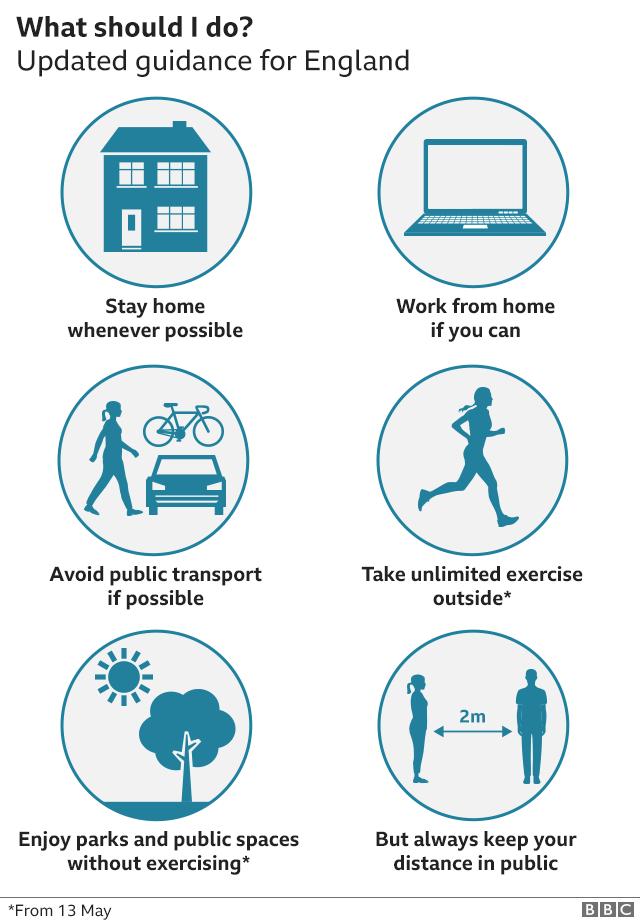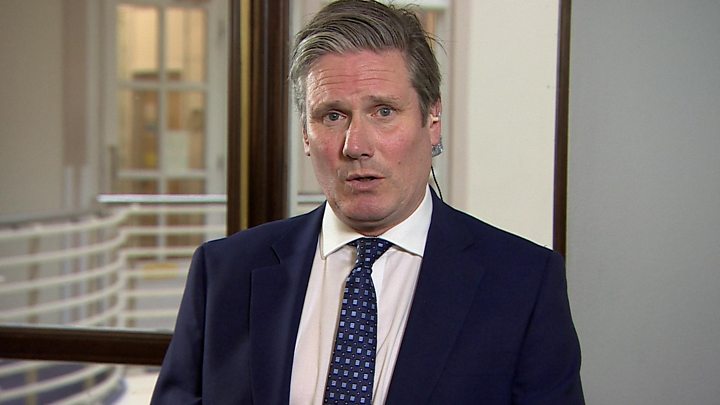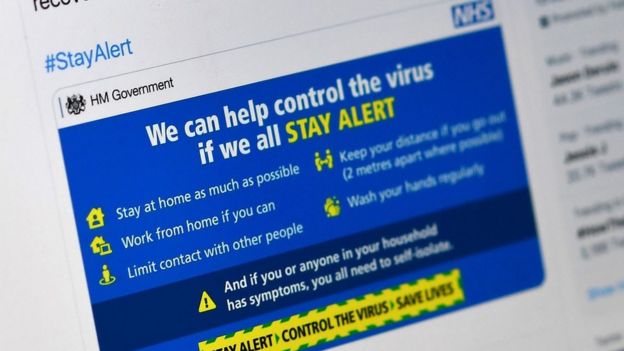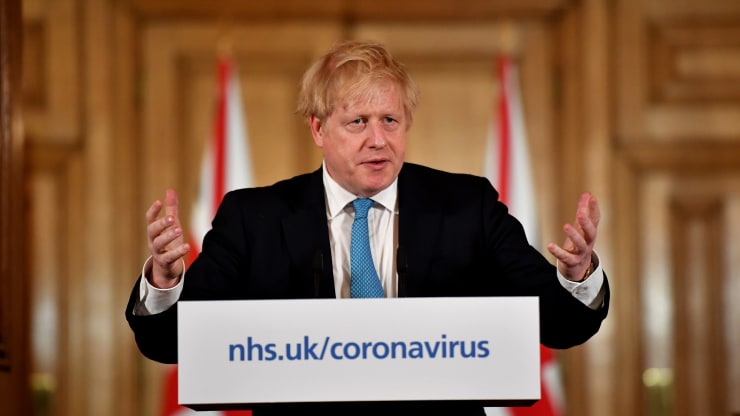Boris Johnson has unveiled a "conditional plan" to reopen society, allowing people in England to spend more time outdoors from Wednesday.
The PM also said people who could not work from home should return to the workplace - but avoid public transport.
He said a new Covid Alert System with five levels would govern how quickly lockdown restrictions could be eased.
He hoped the next step "at the earliest by 1 June" would be for some primary pupils to return to school in England.
In an address to the nation, Mr Johnson said this stage would also involve reopening shops - but he cautioned this would only happen if supported by science.
The next step could see some hospitality businesses and other public places reopen - "if the numbers support it" - but not earlier than 1 July.
He said these steps formed part of a "first sketch of a roadmap for reopening society".
The PM added: "This is not the time simply to end the lockdown this week. Instead we are taking the first careful steps to modify our measures."
Mr Johnson also confirmed that fines for the "small minority who break" lockdown rules will increase.
Further details about England's lockdown are expected in guidance to be published on Monday.
A government official told the BBC the new guidance will say you can meet one person from outside your own household in a park, if you stay two metres apart.
People will also be allowed to drive to parks and beaches in England as long as they observe social distancing while there, according to the official.
However, there will be no change in the advice for those who are shielding and have been asked to stay at home for at least 12 weeks.
BBC political editor Laura Kuenssberg said that, while the coronavirus has started to come under control, the PM's cautious announcement was "certainly not some kind of dramatic flinging of the doors open".
Clarifying the conditions in which schools and shops would reopen, Mr Johnson said: "Throughout this period of the next two months we will be driven not by mere hope or economic necessity.
"We are going to be driven by the science, the data and public health.
"And I must stress again all of this is conditional, it all depends on a series of big ifs."
The PM explained how the "R" number - the reproduction rate of the virus - would be crucial in deciding whether lockdown could be eased further.
Experts have said that keeping R below 1 - meaning one person with the virus passes it on to one other person - is the priority.
"It depends on all of us - the entire country - to follow the advice, to observe social distancing, and to keep that R down," he said.

The PM said those who could not work from home would now be encouraged to return to work - but they should avoid using public transport to get there if possible.
Mr Johnson mentioned construction and manufacturing as examples of the sorts of industries where restarting would now be explicitly encouraged.
Workplaces would receive guidance on how to become "Covid secure", he added.
He said in addition to being able to leave home as many times as they wish for exercise or to sunbathe in parks, people in England would also be able to drive to other destinations.
The PM also said he was "serving notice" that it would soon be the time to impose a quarantine on people coming into the country by air.
In a joint statement later, Mr Johnson and French President Emmanuel Macron agreed quarantine measures would not apply between France and the UK "at this stage".

'Trying to pull off the impossible'

The prime minister is effectively trying to pull off the impossible. He wants to try to restart normal life, while keeping the virus at bay with limited means to do so.
With no vaccine, the government is reliant on containing any local outbreaks.
But the problem is that even with the extra testing that has been put in place over the past month, there are big holes in the UK's ability to suppress the virus. It takes too long to get test results back - several days in some cases - and those most in need of regular testing, such as care home staff for example, are still reporting they cannot always access tests.
Our ability to trace the close contacts of infected people remains unknown - the piloting of the system, which involves the use of an app and army of contact tracers, has just started on the Isle of Wight. It means we are effectively fighting this "invisible killer" with one hand behind our back.
We are not alone in struggling, similar problems are being encountered by other countries. But we are still some way behind the best prepared and equipped, such as Germany and South Korea.

Labour leader Sir Keir Starmer said Mr Johnson's speech lacked "clarity and consensus" and raised "as many questions as it answers".
He told BBC News that millions of people who cannot work from home were effectively being told to go to work with just 12 hours' notice - and not to use public transport.
"That's why I say the statement raises as many questions as it answers," he said.
Acting Lib Dem leader Sir Ed Davey said he did not understand why the government had changed its messaging at this stage.
"It risks what people have fought so hard for," he said.

Mr Johnson said in his speech he had consulted "across the political spectrum, across all four nations of the UK" and that his plan was a "a general consensus on what we could do".
But Scottish First Minister Nicola Sturgeon said after the speech she felt the PM should have stressed "more strongly" that most of the changes he referred to in his speech applied to England only.
The PM earlier unveiled the new message of "stay alert, control the virus, save lives" in England - but Ms Sturgeon said it would not apply in Scotland at the moment.
The Northern Ireland Executive said it would "consider its plan for a phased, strategic approach to recovery" at a meeting on Monday.
Wales' health minister Vaughan Gething also said there had not been a "four-nations agreement" on the new "stay alert" message and that the advice to "stay at home" in Wales was unchanged.
Scotland, Wales and Northern Ireland have powers over their own lockdown restrictions, with England's measures set by the government at Westminster. While leaders have expressed a wish to move forward as one, they may do so at different speeds.
Previous guidance published by the government said people could leave home once a day to exercise in England.

A further 269 people have died in the UK after testing positive for coronavirus, taking the total number of deaths recorded to 31,855.
The number of deaths recorded tends to be lower over the weekend because of reporting delays.
Latest Stories
-
Real Madrid beat Sevilla to keep pressure on leaders Atletico
19 minutes -
Liverpool put six past Spurs to go four points clear
21 minutes -
Manchester United lose 3-0 at home to Bournemouth yet again
24 minutes -
CHAN 2024Q: ‘It’s still an open game’ – Didi on Ghana’s draw with Nigeria
32 minutes -
CHAN 2024Q: Ghana’s Black Galaxies held by Nigeria in first-leg tie
2 hours -
Dr Nduom hopeful defunct GN bank will be restored under Mahama administration
2 hours -
Bridget Bonnie celebrates NDC Victory, champions hope for women and youth
2 hours -
Shamima Muslim urges youth to lead Ghana’s renewal at 18Plus4NDC anniversary
3 hours -
Akufo-Addo condemns post-election violence, blames NDC
3 hours -
DAMC, Free Food Company, to distribute 10,000 packs of food to street kids
5 hours -
Kwame Boafo Akuffo: Court ruling on re-collation flawed
5 hours -
Samuel Yaw Adusei: The strategist behind NDC’s electoral security in Ashanti region
5 hours -
I’m confident posterity will judge my performance well – Akufo-Addo
5 hours -
Syria’s minorities seek security as country charts new future
6 hours -
Prof. Nana Aba Appiah Amfo re-appointed as Vice-Chancellor of the University of Ghana
6 hours

